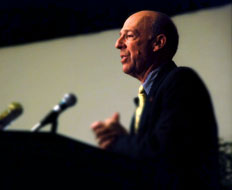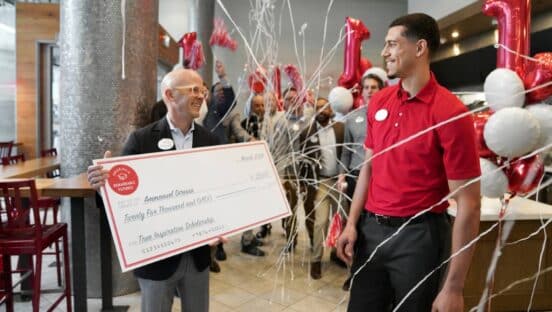In an era when traditional business models and strategic plans often can’t stop bleeding profits, quick-serve executives at QSR’s Dine America conference this week hinted that the new age of business growth may be less about an investment in the consumer—and more about an investment in employees.
The sentiment that a strong brand culture built among employees can translate to a quality experience for the consumer was a reoccurring theme at the conference.
Howard Putnam, a keynote speaker at Dine America, is the former CEO of Southwest Airlines and author of the book The Winds of Turbulence. When Putnam was head of Southwest Airlines from 1978 to 1981, he said one of the company’s biggest priorities was to foster a tight-knit family among employees and to use it to build a successful brand culture.
That investment is what has helped turn Southwest Airlines into one of the top airlines in the world, he said.
“We wanted to say to the employees, ‘You’re No. 1,’” Putnam said in his Dine America speech. “We never said the customer is not No. 1, but we always started with the employees. And they still do.”
Joe Tortorice Jr., another keynote speaker at Dine America and the founder and CEO of Jason’s Deli—a company known for its low turnover and high AUV—told the audience during his speech that too many American companies are built for a short-term run, not long term. He said that while European companies often last two to three centuries, the average American company only lasts 20–40 years.
“Companies die young because their managers focus on the economics of producing goods and services, and forget that an organization is a community of human beings,” Tortorice said.
At Jason’s Deli, Tortorice said time is invested not just in the business side of both corporate and store employees, but in their personal lives as well. This is especially critical in a rocky economic environment that has increased the stress level of American workers, he said.
“What do we need more of today? Leadership, vision, alignment, inspiration, [and] motivation,” Tortorice said. “We all know the frantic pace of life. Our people that work for us are exposed to so much negativity, by the time they get to the office or to the deli, they’re like deer in the headlights—they’re concerned about health, they’re concerned about economics, they’re concerned about the future of the country.”
Jason’s Deli employees are regularly treated to classes that teach life skills such as core values, ethics, finances, and wellness, Tortorice said. Those services are part of the reason why 30 percent of managers in the Jason’s Deli system started out as floor employees.
“There’s a significant difference between authority and power, and I think this where a lot of us miss it,” he said. “Authority is influence; people want to do something for you out of admiration and respect. On the other hand, power breeds fear.”
Don Fox is the CEO of Firehouse Subs and moderated a Dine America panel about the importance of strong bonds between franchisor and franchisees in the quick-serve industry. He said the investment in a system’s employees is so important that he visits every Firehouse Subs market—and each store within the markets—twice a year.
“The only thing that really differentiates the 392 stores in our system are the people,” Fox said. “When they close up tonight, I’ve got 392 managers walking out and locking the door, and for all intents and purposes they’re leaving behind 392 identical restaurants with the same décor, selling the same menu, at roughly the same prices.
“What really separates the top performers from the bottom is who shows up in the morning and unlocks the door and walks in. As a franchisor, you’ve got to get that component right when you start.”
One strategy that two attending executives said works well in building a united brand culture is regular company communication, such as a newsletter serving as encouragement.
Cheryl Bachelder, president and CEO of Popeyes Louisiana Kitchen parent company AFC Enterprises Inc. and Dine America keynoter, said in her speech she sends an e-mail to franchisees every Sunday night “to explain what we’re doing, where we’re at, what decisions are being made, and what results are being accomplished.”
The e-mail, she said, is an effort to become more transparent and communicative so that the whole brand can grow in the same direction.
“Culturally, we’ve been developing a new way to work at Popeyes,” Bachelder said. “A culture where our team members partner with each other and with our owner/operators to deliver results. We’re building a culture where honest dialogue and mutual trust are helping us win in the marketplace.”
Tortorice said Jason’s Deli sends out a daily newsletter called “Daily Bread,” where the chief executive includes a famous quote or Bible scripture to motivate employees.
The quote the day Tortorice spoke to the Dine America standing-room-only crowd? “Many of life’s failures are people who do not realize how close they were to success when they gave up.”
“People really are looking for three things out of leadership: direction, trust, and hope,” Tortorice said. “Without vision, people lose hope.”








